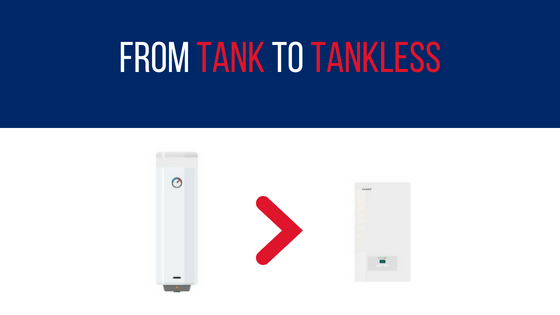Steadily over time, energy-efficient products have grown in popularity for forward-thinking or environmentally conscious individuals. Homeowners have the opportunity to save on energy costs with solar panels, programmable thermostats, high SEER air conditioning units, and tankless water heaters.
If your water heater is leaking and you need a hot water tank replacement, or you’re in the market for a more efficient unit, it’s a good idea to learn what a tankless water heater can offer and decide from that information if it’s a good fit for you and your family.
What’s the Difference Between a Tankless and a Traditional Tank Water Heater?
Traditional Tank Water Heater

The hot water tank you have in your basement right now stores and preheats, on average, 30-50 gallons of water. Whenever you or someone in your household does a load of laundry, runs the dishwasher, uses hot water in the sink, or takes a shower, that supply of preheated water is utilized.
The tank automatically replenishes it’s supply of preheated water to ensure there is always the max number of gallons ready to use. Of course, if multiple appliances are tapping into the same hot water source at the same time – like a shower and the washing machine – the tank can temporarily run out of hot water.
Tankless Water Heater

A tankless water heater – also known as a continuous flow, on-demand, or instant water heater – uses electric or gas to heat cool water through an exchanger coil pipe whenever it is needed. It also heats water very quickly.
A tankless water heater does not retain or store any water internally like a tank water heater. Because of this, there is a limit to how much water can be delivered at once (depending on the size of heater).
Benefits of Tankless Water Heaters
Most tankless water heaters that are produced today are high-efficiency, direct-vent units, and deliver four big benefits:
1. Smaller in Size.
As the images above highlight, tankless water heaters are smaller, more compact in size. Their size enables them to be installed on walls, rather than taking up a substantial amount of floor space. Additionally, tankless water heaters can be installed outside on certain homes.
2. Low Energy Consumption.
With no tank of water needing to be continuously heated, tankless water heaters bypass the energy expenditure tank-style water heaters have. In other words, a tankless water heater isn’t constantly running. It only turns on when you need it to.
3. Unlimited Hot Water Supply.
Tankless water heaters deliver as much hot water as you desire. To be clear, as stated above, the size of unit will have a limit as to how much water can be delivered at once. But, as long as a large enough tankless water heater is installed, there shouldn’t be a problem with the hot water flow.
4. Longer Lifespan.
On average, tankless water heaters last 20+ years – which is almost double the life of a traditional water heater at 10-15 years.
Drawbacks of Tankless Water Heaters
It’s always a good idea to weigh the pros and cons. Here are four drawbacks to tankless water heaters:
1. Higher Initial Cost
With a longer lifespan and higher efficiency, tankless water heaters are inherently more expensive. In many cases, tankless water heaters can also cost more to install than traditional tank heaters.
2. Inconsistent Temperatures
The innerworkings of a tankless water heater make some functionality limited and cause inconsistent temperatures. For example, tankless water heaters have a harder time sending hot water to multiple appliances/outlets at once – like the simultaneous shower and washing machine example.
3. Additional Equipment is Sometimes Necessary
Hard water can often spell disaster for tankless water heaters. To remedy this, a water softener can be installed to help the tankless heater operate properly. The downside to all of this: A softener is bulky and can sometimes take up more space than a traditional water heater would.
4. Additional Maintenance is Required
Tankless water heaters must be flushed (to prevent mineral build-up in the heater or water line), drained and have their filters changed monthly. This maintenance is not only mandatory to ensure a long life for your heater, but it’s also required to keep most warranties valid.
When to Switch to a Tankless
If you’re considering switching to a tankless water heater, the best and most helpful first step is to contact a top-rated, licensed plumber to assess your situation and walk you through their recommendations.
Typically, tankless heaters are great options for households that:
- Don’t use hot water from several sources at once, such as running the dishwasher and the laundry machine simultaneously.
- Use less than 40 gallons of hot water per day.
- Have several people consistently using hot water, such as back-to-back showers.
Check out our How to Choose a Water Heater Guide for more in-depth information on tankless water heaters.
In-Home Estimate and Expert, Honest Advice
Whether your water heater is leaking and you need a hot water tank replacement, or you want to replace your hot water tank with an energy-efficient unit, get in touch with Certified Services for an in-home estimate and expert recommendations.
One of our technicians can walk you through all of your options and help you decide which water heater is best for you.



